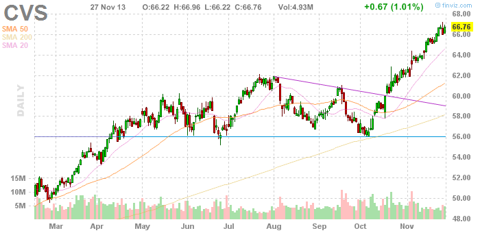On Wednesday, November 27, CVS Caremark (CVS) announced the $2.1 billion dollar acquisition of Coram, LLC which is the specialty infusion and enteral nutrition arm of Apria Healthcare. In the wake of Wednesday's announcement I not only wanted to briefly discuss the transaction and when investors can expect it to impact earnings, but also highlight a number of reasons why I'm staying long on shares of CVS Caremark.
A Brief Overview of the Transaction
CVS Caremark has beefed up its specialty pharmacy offerings, agreeing to buy the specialty infusion services and enteral nutrition business Coram, LLC (a unit of Apria Healthcare) for about $2.1B. It should be noted that the Coram transaction is expected to generate about $1.4B in revenue in its first year following the deals close which is expected to occur during Q1 2014.
In terms of the acquisition of Coram by CVS Caremark, analysts at Wells Fargo noted that "this transaction should strengthen CVS' positioning in the specialty pharmaceutical business, which we believe is increasingly critical in driving growth for the PBMs, particularly as we believe historical sources of earnings growth taper (including generics and mail order). Walgreen (WAG) is currently the market leader in the specialty pharmacy business, followed closely by CVS and the acquisition of Coram should strengthen CVS' positioning."
Earnings Impact
How will the acquisition of Coram impact CVS' results? Initially, the transaction is expected to have a negligible impact on the company's FY14 results, however the company's FY15 results are expected to see a positive impact of anywhere between $0.03/share and $0.05/share in terms of full year EPS. If the transaction can enhance CVS' position within the specialty pharmaceutical business as the above mentioned analysts had noted, I think the impact could be much greater than the $0.03/share-to-$0.05/share range the company is anticipating.
Recent Performance And Trend Behavior
On Wednesday, shares of CVS, which currently possess a market cap of $80.5 billion, a forward P/E ratio of 14.82, and a dividend yield of 1.36% ($0.90), settled at a price of $66.76/share. Based on their closing price of $66.76/share, shares of CVS are trading 3.64% above their 20-day simple moving average, 9.18% above their 50-day simple moving average, and 14.86% above their 200-day simple moving average. These numbers indicate a short-term, mid-term and long-term uptrend for the stock which generally translates into a moderate buying mode for both short-term traders and long-term investors.
Recapping CVS Caremark's Strong Q3 Results
On Tuesday, November 5, CVS Caremark reported EPS of $1.09/share and revenue of $32 billion for the third quarter. These results had surpassed both analysts' EPS estimates by a margin of $0.07/share and revenue estimates by a margin of $470 million. Some of the more positive notes to come out of the company's earnings announcement included but were not limited to a 7.8% increase in Pharmacy Services Revenues (Q3 Pharmacy Services Revenues were $19.5 billion, and they were mainly driven by higher claims and higher drug prices) as well as a 5% jump in Retail Pharmacy Sales (Q3 Retail Pharmacy sales were $16.3 billion, which were driven higher by an increase in prescription volumes).
Risk Factors
Are there any risk factors investors should consider before establishing a position in CVS Caremark? Yes there are, and according to the company's most recent 10-K, there are a number of risk factors all investors should consider. These factors include but are not limited to the possibility of PBM client loss and/or the failure to win new PBM business, certain risks which may be related to the frequency and rate of the introduction of generic drugs and brand name prescription products, and lastly, certain risks relating to the market availability, suppliers and safety profiles of prescription drugs that CVS Caremark purchases and sells.
Conclusion
For those of you who may be considering a position in CVS Caremark, I'd keep a watchful eye on a number of things over the next 12-24 months as each could play a role in the company's long-term growth. For example, near-term investors should focus on the company's recent performance and trend behavior, while long-term investors should keep an eye on how much of an impact the acquisition will have on both the EPS and revenue performance of CVS Caremark over the next 18-36 months.
Disclosure: I am long CVS. I wrote this article myself, and it expresses my own opinions. I am not receiving compensation for it (other than from Seeking Alpha). I have no business relationship with any company whose stock is mentioned in this article. (More...)
This entry passed through the Full-Text RSS service — if this is your content and you're reading it on someone else's site, please read the FAQ at fivefilters.org/content-only/faq.php#publishers.
from SeekingAlpha.com: Home Page http://seekingalpha.com/article/1868681-as-cvs-caremark-acquires-coram-from-apria-healthcare-heres-why-im-staying-long?source=feed

Aucun commentaire:
Enregistrer un commentaire